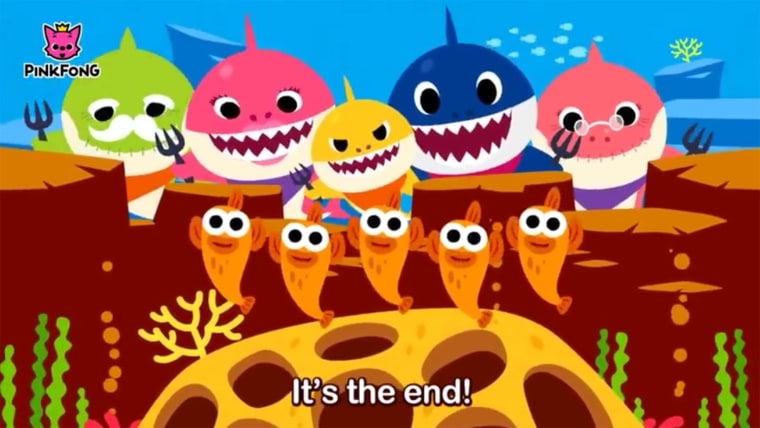Pop-watchers with a more cynical outlook on the charts probably took the Billboard Hot 100 debut of "Baby Shark" — the incessantly earwormy singalong about a family of finned fish — as a further sign of music's 21st-century regression. A kid's song? In the top 40?
But the chart success of "Baby Shark" is actually indicative of how America's pop charts are slowly getting better at tracking real-time listening habits (i.e., what you stream when left to your own devices), whether or not the songs within are promoted by radio programmers and streaming-service gurus.
I first heard about the song from chart powerhouse slash new mom Cardi B, who's made multiple references to it on social media, but for those of you unfamiliar with "Baby Shark," here’s a primer. Its exact origin is a bit cloudy, although its insistent melody and loop-de-loop structure bear out claims that it started out as a campfire song. In 2007, German proto-vlogger Alexandra Müller posted her take on the song online, and it became such a sensation that a thumping techno remix got a major-label release in 2008. Seven years after that, the South Korean educational brand Pinkfong released its own version of the track, reissuing it with an easily mimickable dance video in 2016.
The introduction of a dance challenge (the #BabySharkChallenge, in hashtag parlance) helped "Baby Shark" slowly take over the world, hitting big in Indonesia in 2017 and spreading throughout Southeast Asia before reaching the U.K.'s singles chart — a much more novelty-song-friendly place than its American counterpart, if you remember "Crazy Frog – Axel F" or "Can We Fix It?". That's partially because the U.K. charts are only based on consumption — physical sales, streaming, and downloads — while the Hot 100, the biggest singles chart released by the industry bible "Billboard," takes radio play into account as well.
But the gradual introduction of streaming stats into the Hot 100 has certainly helped other novelties bob around the lower reaches of the chart. When Taylor Swift was holding her 2014 mega-seller "1989" off Spotify, the metalcore band I Prevail capitalized on search traffic with a cover of "Blank Space" that reached No. 90; accordion-playing jokeman "Weird Al" Yankovic's grammar-focused "Blurred Lines" parody "Word Crimes" became his fourth top-40 hit (and first since 2006's "White & Nerdy") in 2014. And the Norwegian yuksters Ylvis rode their jokey "The Fox (What Does the Fox Say?)" all the way to No. 6 in 2013.
Streaming has been the main chart driver for "Baby Shark," too. As of this writing, the Pinkfong version is No. 16 on Billboard's Streaming Songs chart and, on YouTube, it has 2.16 billion views as of Friday afternoon. But it isn't in the Top 100 on Apple Music's U.S. charts, nor is it in the Top 50 on Spotify's U.S. chart — both of which hint that "Baby Shark" is a largely YouTube-driven phenomenon.
Changes to the charts have wreaked havoc on perceptions of music consumption in the past. When "Billboard" introduced the bar-code-scanning technology SoundScan to its charts in 1991 as a way of tracking sales, big pop albums like Paula Abdul's "Spellbound" took a hit, while hip-hop and hard rock artists like N.W.A and Skid Row surged. When the Hot 100 began incorporating data from YouTube to figure out the week's biggest hits in 2013, another track that had an attendant dance craze — Baauer's booming "Harlem Shake" — had its chart fortunes improve drastically. Meanwhile, the inclusion of streaming stats in chart calculations means that massive artists like Drake can blanket the Hot 100 with each individual cut from a blockbuster album.
Streaming-only successes like Drake's album cuts do have their limits, though, because of the importance that radio still holds when it comes to chart calculations; YouTube-borne phenomena like "Baby Shark" have an extra hurdle to jump over after changes made in May that weigh "paid subscription" streams (to services like Spotify, Tidal and Apple Music) more than ad-supported ones like YouTube.
The song's fate will likely be similar to that of many country songs — take, for example Dan + Shay's gently twangy ballad "Speechless," which has hung around the Hot 100 for nearly a year but has yet to break through to the Top 20 because of a lack of airplay from non-country stations. It's a very popular song among a certain group of listeners — but it's lacking that perception of mass consumption that'll vault it into the higher ranks.
"Baby Shark" might never hit No. 1, but the eyebrow-raising over its landing in the Top 40 says a lot about how the way "popular" music is perceived; it also shows how the idea of on-demand music has altered what pop is, or what it can be. And who knows? Maybe the Cardi B remix that'll propel it to the chart's summit is right around the corner.
